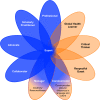Physiotherapy beyond Our Borders: Investigating Ideal Competencies for Canadian Physiotherapists Working in Resource-Poor Countries
- PMID: 24719503
- PMCID: PMC3941134
- DOI: 10.3138/ptc.2012-54
Physiotherapy beyond Our Borders: Investigating Ideal Competencies for Canadian Physiotherapists Working in Resource-Poor Countries
Abstract
Purpose: To explore the perspectives of Canadian physiotherapists with global health experience on the ideal competencies for Canadian physiotherapists working in resource-poor countries.
Method: A qualitative interpretive methodology was used, and the Essential Competency Profile for Physiotherapists in Canada, 2009 (ECP), was employed as a starting point for investigation and analysis. Semi-structured one-on-one interviews (60-90 minutes) were conducted with 17 Canadian physiotherapists who have worked in resource-poor countries. Descriptive and thematic analyses were conducted collaboratively.
Results: The seven ECP roles-Expert, Communicator, Collaborator, Manager, Advocate, Scholarly Practitioner, and Professional-were all viewed as important for Canadian physiotherapists working in resource-poor countries. Two roles, Communicator and Manager, have additional competencies that participants felt were important. Three novel roles-Global Health Learner, Critical Thinker, and Respectful Guest-were created to describe other competencies related to global health deemed crucial by participants.
Conclusions: This is the first study to examine competencies required by Canadian physiotherapists working in resource-poor countries. In addition to the ECP roles, supplementary competencies are recommended for engagement in resource-poor countries. These findings align with ideas in current global health and international development literature. Future research should examine the relevance of these findings to resource-poor settings within Canada.
Objectif : Analyser ce que les physiothérapeutes du Canada qui ont de l'expérience en santé dans le monde pensent des compétences idéales des physiothérapeutes canadiens œuvrant dans des pays pauvres en ressources. Méthode : À partir d'une méthodologie d'interprétation qualitative et en nous fondant sur le Profil des compétences essentielles des physiothérapeutes au Canada, 2009 (CEP) comme point de départ de l'étude et de l'analyse, nous avons procédé à des entrevues personnelles et structurées (60 à 90 minutes) auprès de 17 physiothérapeutes du Canada qui ont travaillé dans des pays pauvres en ressources. Des analyses descriptives et thématiques ont été réalisées en collaboration. Résultats : Les sept rôles reliés aux CEP—expert, communicateur, collaborateur, gestionnaire, promoteur, érudit et professionnel—ont tous été considérés comme importants pour les physiothérapeutes canadiens qui travaillent dans des pays pauvres en ressources. Deux rôles, soit ceux de communicateur et de gestionnaire, comportent des compétences supplémentaires que les participants ont jugées importantes. Trois rôles nouveaux—apprenant en santé dans le monde, penseur critique et invité respectueux—ont été créés de façon à décrire d'autres compétences liées à la santé dans le monde jugées cruciales par les participants. Conclusions : Il s'agit de la première étude qui porte sur les compétences dont ont besoin les physiothérapeutes canadiens travaillant dans des pays pauvres en ressources. Outre les rôles reliés aux CEP, d'autres compétences sont recommandées pour travailler dans des pays pauvres en ressources. Ces constatations concordent avec les concepts que véhiculent des publications courantes sur la santé dans le monde et le développement international. Des recherches futures devraient porter sur la pertinence des constatations pour les contextes pauvres en ressources au Canada.
Keywords: competency-based education; developing countries; qualitative research; world health.
Figures
Similar articles
-
Excelling in the role of advocate: a qualitative study exploring advocacy as an essential physiotherapy competency.Physiother Can. 2014 Winter;66(1):74-80. doi: 10.3138/ptc.2013-05. Physiother Can. 2014. PMID: 24719513 Free PMC article.
-
A Pan-Canadian Perspective on Education and Training Priorities for Physiotherapists. Part 2: Professional Interactions and Context of Practice.Physiother Can. 2023 Feb 8;75(1):55-64. doi: 10.3138/ptc-2020-0122. eCollection 2023 Winter. Physiother Can. 2023. PMID: 37250727 Free PMC article.
-
What occupational therapists' say about their competencies' enactment, maintenance and development in practice? A two-phase mixed methods study.BMC Med Educ. 2020 Jun 15;20(1):191. doi: 10.1186/s12909-020-02087-4. BMC Med Educ. 2020. PMID: 32539754 Free PMC article.
-
Roles, Training, and Qualifications of a Case Manager in the Canadian Health Care Industry: A Narrative Review.Prof Case Manag. 2021 Jan/Feb;26(1):27-33. doi: 10.1097/NCM.0000000000000425. Prof Case Manag. 2021. PMID: 33214509 Review.
-
Advanced musculoskeletal physiotherapy practice: Informing education curricula.Musculoskelet Sci Pract. 2020 Aug;48:102174. doi: 10.1016/j.msksp.2020.102174. Epub 2020 Apr 30. Musculoskelet Sci Pract. 2020. PMID: 32560874 Review.
Cited by
-
How are Canadian universities training and supporting undergraduate medical, physiotherapy and occupational therapy students for global health experiences in international low-resource settings?Can J Public Health. 2016 Dec 27;107(4-5):e373-e380. doi: 10.17269/cjph.107.5567. Can J Public Health. 2016. PMID: 28026700 Free PMC article.
-
Analyzing international clinical education practices for Canadian rehabilitation students.BMC Med Educ. 2014 Sep 9;14:187. doi: 10.1186/1472-6920-14-187. BMC Med Educ. 2014. PMID: 25199819 Free PMC article.
-
Methodological approaches for identifying competencies for the physiotherapy profession: a scoping review.Discov Educ. 2022;1(1):9. doi: 10.1007/s44217-022-00008-9. Epub 2022 Jun 28. Discov Educ. 2022. PMID: 35813902 Free PMC article.
-
Human resources for health (and rehabilitation): Six Rehab-Workforce Challenges for the century.Hum Resour Health. 2017 Jan 23;15(1):8. doi: 10.1186/s12960-017-0182-7. Hum Resour Health. 2017. PMID: 28114960 Free PMC article. Review.
-
Pre-Departure Training for Student Global Health Experiences: A Scoping Review.Physiother Can. 2017;69(4):343-350. doi: 10.3138/ptc.2015-86GH. Physiother Can. 2017. PMID: 30369702 Free PMC article.
References
-
- Alappat C, Siu G, Penfold A, et al. Role of Canadian physical therapists in global health initiatives: SWOT analysis. Physiother Can. 2007;59(4):272–85. http://dx.doi.org/10.3138/ptc.59.4.272. - DOI
-
- Crawford E, Biggar JM, Leggett A, et al. Examining international clinical internships for Canadian physical therapy students from 1997 to 2007. Physiother Can. 2010;62(3):261–73. http://dx.doi.org/10.3138/physio.62.3.261. Medline:21629605. - DOI - PMC - PubMed
-
- Cameron D. Working internationally. Phys Occup Ther Pediatr. 2008;28(2):109–16. http://dx.doi.org/10.1080/01942630802031792. Medline:18846891. - DOI - PubMed
-
- Haq C, Rothenberg D, Gjerde C, et al. New world views: preparing physicians in training for global health work. Fam Med. 2000;32(8):566–72. Medline:11002868. - PubMed
-
- World Health Organization, the World Bank. World report on disability 2011 [Internet] Geneva: WHO Press; 2011. [cited 2012 Jul 1]. Available from: http://www.who.int/
LinkOut - more resources
Full Text Sources
Other Literature Sources


